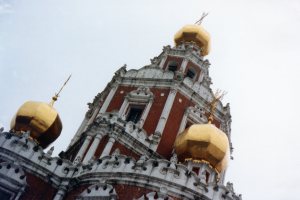Russia’s fusion of nationalism, Russian Orthodox Christianity and reverence for (heavily sanitized) aspects of the Soviet past continues to evolve in less than reassuring ways
As voters in most of Ukraine prepare to go to the polls on Sunday to elect a new parliament, the rebels in the east are planning their own vote a week later. For many of the pro-Russian rebels, both local and Russian volunteers, their political vision for the region is the creation of “Novorossia”, a kind of new, improved Russia.
“We are fighting for the liberation of all Russian lands and we are ready to march all the way to the Danube,” says Alexander Matyushin, a rebel field commander.
“We must restore the historic injustice which befell the Russian people in the 20th Century. We need to take land which is ours by right and bring it back into the fold of Holy Russia.”
Matyushin’s fighters – just over 100 of them – are stationed in his native Makiivka, a suburb of Donetsk, which is the largest city under rebel control in eastern Ukraine. The great irony of this conflict is that 10 years ago Mr Matyushin was on the other side of the political divide which now splits this country in two.
He used to work with a far-right Ukrainian nationalist, Dmytro Korchynsky. “We had the idea of a Christian Orthodox revolution back then,” explains Mr Matyushin. “Our ambition was to create an Orthodox al-Qaeda.”
A legacy of communism, in Ukraine as well as Russia, was civil society in ruins, a gap that was—and is—an invitation to the extremes.
Back to the BBC:
The rebels say they have 18,000 volunteer fighters, mostly from Russia, and that more are keen on joining. Several far-right organisations are involved in the online recruitment process. One of them is the Eurasian Movement, a far-right political group with an international reach, founded by ultra-nationalist philosopher Alexander Dugin. Close to the Ukrainian border, in the Russian city of Rostov, one of Dugin’s Eurasian activists, Mikhail Uchitel, is working with Russian volunteer fighters who have been signed up online in preparation for their journey into Ukraine. Although the recruitment process is taking place in Russia, Mr Uchitel is adamant that the rebels do not answer to Moscow.
Yes and no, I’d say. And sometimes, I suspect, puppets just don’t see the strings.


An Eastern Orthodox Al-Qaeda makes me think of Neal Stephenson’s 1992 novel Snow Crash, in which something like that occurred.